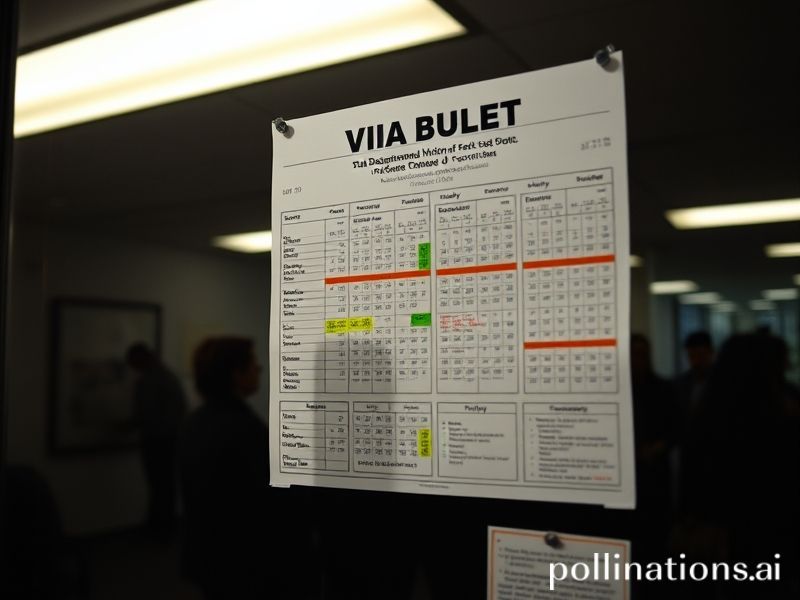Global Souls vs. the Visa Bulletin: How One Spreadsheet Runs the World’s Hopes
Every month, like a grim bingo caller in a fluorescent-lit purgatory, the U.S. Department of State releases the Visa Bulletin—an Excel sheet that quietly decides whether your cousin in Manila will see her fiancé this decade or whether that software engineer in Bengaluru can finally stop pretending he enjoys “team-building” Zoom calls. Across time zones, WhatsApp groups combust, immigration lawyers raise their hourly rates in silent jubilation, and somewhere a bureaucrat in Lisbon mutters, “At least we’re not the ones breaking hearts with a PDF.”
The bulletin looks harmless enough: tables of letters (F1, F2A, EB-3) and dates that might as well be Mayan glyphs to the uninitiated. But those dates are the international date-palm line between hope and existential dread. If your “priority date” is before the magic number printed in 11-point Times New Roman, congratulations—you may now pay additional fees. If not, enjoy another spin around the sun practicing mindfulness while your life ferments like kombucha on a windowsill.
Globally, the bulletin is the dark mirror of meritocracy. It tells a Ukrainian doctor fleeing artillery barrages that she is less urgent than a Canadian TikTok influencer who married a U.S. citizen after a weekend in Vegas. It informs an Indian coder with three patents that he must cool his heels behind a backlog longer than the Mahabharata, while an Irish bartender with a single grandparent born in Ohio skips ahead like a leprechaun on Red Bull. Somewhere in Nairobi, a startup founder with VC funding learns that “extraordinary ability” still loses a footrace to “grandma was born in Queens.” The world nods: fairness is a dish best served over-cooked.
Yet the bulletin’s real genius is exporting America’s bureaucratic angst to every corner of the planet. In Ho Chi Minh City, coffee shops have bulletin-watch parties—baristas pause mid-pour when someone shrieks “EB-2 moved two weeks!” In Lagos, pastors incorporate the bulletin into Sunday sermons: “And lo, the dates crept forward like sloths on Ambien.” In London, Brexit-weary remainers scroll the bulletin to feel marginally better: “At least we’re not trapped by a spreadsheet,” they tell themselves, forgetting they’re trapped by an island instead.
Of course, other countries have their own visa pecking orders, but none publish them with such exquisite, slow-motion cruelty. Canada’s Express Entry is a slot machine with polite graphics; Australia’s points system at least pretends to be a meritocratic video game. Only the United States mails you a love letter that says, “Maybe next year, champ,” then charges you for the stamp.
The broader significance is geopolitical Kabuki. Washington insists the bulletin is a neutral “demand-driven system,” which is a bit like saying the Titanic’s seating chart was wave-driven. Every delay is a small diplomatic tremor: Indian outsourcing firms lobby Congress with the subtlety of a sitar at a death-metal concert; Chinese investors divert capital to Portugal’s golden visa program; Filipino nurses eye Germany’s new fast-track scheme and wonder why they ever learned to pronounce “Mississippi.” The bulletin thus becomes an accidental instrument of soft power, nudging talent toward Berlin’s cold winters and Lisbon’s custard tarts. Uncle Sam shrugs: if you don’t like the queue, try another empire.
Economists estimate the backlog costs the U.S. billions in unrealized GDP, but that assumes human beings are merely labor inputs rather than creatures who fall in love, have children, and age out of eligibility while waiting for a consular officer who’s on a six-month paternity leave. Meanwhile, the black market in fake priority-date documents flourishes from Kathmandu to Tijuana, proving once again that scarcity plus desperation equals entrepreneurship—the oldest law of the borderless human heart.
And so, on the 10th of every month, the planet holds its breath. The bulletin drops, dreams are upgraded or downgraded like airline seats, and life shuffles forward one square in the great Snakes and Ladders of global mobility. Remember: the house always wins, the ladder is usually missing a rung, and the snake was born in 1970 and still thinks disco is coming back. Until then, keep refreshing that PDF—your future is loading, estimated wait time: 9 to 99 months.







